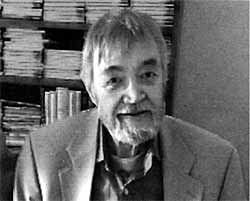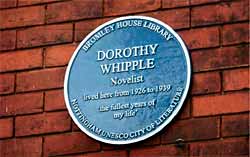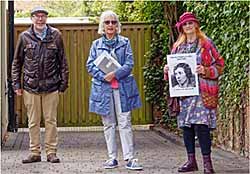News
A word from our Chairman
What will be the ‘word of the year’ 2020? I would make a good case not for ‘coronavirus’ or ‘pandemic’ but ‘unprecedented’. It is the word which experts, pundits and politicians have habitually employed to explain our current situation and rationalise the response to it. Yet, as historians have been quick to point out, however different in context, scale and situation, there are plenty of historical precedents - literally ‘an earlier occurrence of something similar’ - for the events which we have endured this year. The 14th century Black Death was a global pandemic which reached us more slowly than COVID-19 because of the state of communications at the time, whilst the actions of the people of Eyam, Derbyshire, in the 1660s remind us that the human and psychological sacrifices entailed in lockdown are nothing new. In the midst of plague and illnesses which vaccinations had not yet resolved, London’s ‘Bills of Mortality’ communicated the death-toll in a way all too familiar to regular viewers of the daily news bulletins and published data in newspapers and online media. Habitual reference to the ‘Dunkirk Spirit’ this year was fostered by the knowledge that our own monarch is a noticeable living connection with the wartime generation, whilst the exploits of Colonel (Sir) Tom Moore (a man whose name has rich historical connections), and the 75th anniversaries of VE- and VJ-Day, helped to connect our current experiences with past adversity. In times of trouble, we look to historical ‘precedents’ not for lessons which we can apply today but to remind - and perhaps console - ourselves that we have met comparable challenges of this before, have adapted, and in the long run, survived. As a society with a strong sense of historical context, I hope we will find opportunities to meet in the near future and consider what precedents future generations might draw from the year 2020.
Richard A. Gaunt, Chairman
A tribute to Stephen Best 1939-2020

On October 14th that distinguished librarian and local historian, Stephen Best, died at the Forest Care Home, aged 81. He had been suffering from Parkinson’s disease and dementia. He joined Sherwood Street Central Library direct from Nottingham High School at the age of 17. By 1962 he had become a chartered librarian. He worked at several libraries including Carlton Road, Clifton and Gregory Boulevard and from 1964-68 he supervised Sherwood Library. But above all, he was known and appreciated for his time at the Local Studies Library on Angel Row which began in 1974.There many of us benefited from his remarkable knowledge, generosity and humour. Sadly his career declined after he contracted ME in the 1980s and he had to retire in 1989. (When I got ME he was a constant support.) Nevertheless he continued to research and write interesting articles for the Nottingham Civic Society Newsletter and the Sneinton Magazine. (Elaine Harwood acknowledged his help in answering queries about Sneinton for her book about Nottingham.) When he was in his prime, he did much more. Many of you may remember the sixty live phone-in broadcasts for Radio Nottingham on local history which he shared with Keith Train in the 1980s.
Stephen had many other interests. He joined the Nottingham Libraries Cricket XI and became a very good wicket keeper. He loved cricket as it used to be played and collected early Wisdens. But he would have nothing to do with the modern game - he called ‘Stumps’ on it! Collecting was one of his hobbies, starting with cigarette cards and train spotting; his knowledge of railways and trains was phenomenal. Other interests were the built environment, churches, trad Jazz, literature, cinemas and crosswords, at which he won encyclopedias. Not least he was always good company over a glass of wine in a pub. His former library colleagues put together a publication titled ‘Stephen Best at Eighty, An Anthological Fragment or Bestscfift’. In it are not only a few of his articles reproduced, such as the study of ceramic tiles in Sneinton porches, but also examples of his idiosyncratic delight in names and words. They delighted his colleagues by revealing ‘the outlandish, the bizarre and the incredible’. For instance, he loved writing clerihews such as this one below:
William Booth,
Exclaimed ‘Forsooth
The state of England does so alarm me
I think I’ll found the Salvation Army’.
Stephen married Sue in 1980 and became stepfather of her two sons. (They also fostered children for several years.) Sue, Alex and Stuart and Stephen’s brother Peter and five grandchildren survive him. We have lost a much-loved character, a true one-off.
Terry Fry
Society news
From Correspondence with the Editor
Twitter: The Thoroton Society made the move into the world of social media in October 2020. We can now be found on Twitter through the following link: https://twitter.com/ThorotonSociety. With our world becoming increasingly focused on digital content the Council felt it appropriate to offer a new outlet to promote the work of the society. The intention is to make regular posts relating to society events as well as the history, archaeology and conservation of Nottingham more widely. If you are also a Twitter user please do consider following the account and reposting our content. Our social media will be managed by James Wright - if you wish to let him know about any stories that you think we should be covering then please email: james@triskeleheritage.com James Wright
Book Offer: Yale University Press is delighted to offer members of The Thoroton Society a special price for the new Pevsner guide to Nottinghamshire. (See Pete Smith’s book review in Book Reviews later in this Newsletter). Order your copy via their website (www.yalebooks.co.uk/pevsner) and enter code Y2117 at checkout for £5 off*. RRP - £45.00 | Offer Price - £40.00 *UK orders only | Free P&P | Code valid until 31/01/2021.
Nottinghamshire Photo Competition: Win a free copy of Nottinghamshire and another Pevsner guide of your choice in their photo competition. Send a photo of your favourite building in Nottinghamshire along with a short caption explaining why it’s your top pick to the team at https://yalebooksblog.co.uk/2020/10/19/pevsner-nottinghamshire-photo-competition to enter. Entry closes on 31/12/2020.
Pevsner Photograph Exhibition: There will be a future exhibition of the super photographs in the new Pevsner edition, ‘Nottinghamshire’, at the Lakeside. (See Pete Smith’s Review later in this Newsletter). I will make sure once dates are known for this exhibition that members are informed.
Nottinghamshire Local History Association Event: 2020 marks the 400th anniversary of the journey of the Pilgrim Settlers to America. To commemorate the strong connections between our county and this internationally significant event, Nottinghamshire Local History Association have linked up with Nottinghamshire County Council to present a programme of talks by recognised experts in the field. The events are free and booking for the talks will be via Eventbrite. An email will be sent to you with a link for each talk. Please do remember to check your junk/spam folders as the email may land in there! All queries should be directed to James Wright, Programme Secretary for Nottinghamshire Local History Association: james@triskeleheritage.com
The Thoroton Response Group
Some members will be aware that the Society does, from time to time, make representations of concern to various authorities - often those with planning functions - on matters relating to the history or archaeology of our county. Over the years a number of concerns have been brought to the attention of such bodies and it is interesting to consider some of the outcomes of the Response Group’s efforts on your behalf. In the main, the areas on which representations are made fall into:-
- Planning applications on listed buildings, those in conservation areas or any others considered of historic or archaeological interest.
- Draft conservation area plans or appraisals of, or amendments to, existing conservation areas.
- Government, local government or other policy documents relating to the built, historic or archaeological environment, or any policies or plans which may affect these or to any part of such areas in Nottinghamshire.
Some matters which the Response Group has addressed have been long-running, such as the Robin Hood Hotel in Newark (with this there were some fairly minor wins and some losses). Also, the issue of moving the Central Library - back on the agenda due to the Broad Marsh “Conversation”. Other matters have involved one letter to the appropriate authority - not always resolved as we would wish, but one such with a happy ending related to the Majestic Cinema on Woodborough Road which was scheduled for demolition; we were recently informed that it has now been Grade 2 listed and an appropriate future hopefully assured. Last year we challenged the City Council’s policy of charging to inspect artefacts held in museums - we received a measured response but our request for a rethink fell on deaf ears. This year a major issue was an application for a solar farm on the land around the historic conservation village of Halloughton, just outside Southwell. Although fully supporting green energy schemes - in the right place - the Society set out the major drawbacks of installing such constructions on the beautiful sloping fields around the village (containing evidence of their long existence), and with the proposal to site the entrance to this ‘farm’ scheduled to be opposite the Grade 11* Manor Farm House with its important 13th century prebendal tower, and next to the Church of St James where lie in its peaceful churchyard Sir Frank and Lady Doris Stenton and also Philip Lyth, well known to many historians. The outcome is awaited. Most recently we followed up concern regarding Radford Boulevard Board School on which a notice regarding its demolition was affixed. A quick letter of concern was answered with the good news that the demolition related to the modern extension only and that our representation would help to ensure that this fine Hine Junior building would be put on the Nottingham Local List. To be followed up now are the final details of access to the about-to-be-opened Nottingham Castle and also a response to the consultation on the future of Broad Marsh.
The terms of reference for the group also include that “Members of the Society be encouraged to inform the group of issues of concern relating to any of the above, including sites or buildings in danger”. May we reiterate that encouragement - let us know of any threats to our historic county.
Barbara Cast, Response Group Coordinator
Geoffrey Bond and Thoroton Research Awards
Since the award was established in 2015 there have been 23 applications of which 13 were successful in receiving awards. There have been three articles arising from research projects in Transactions so far, with hopefully that on the Saracen’s Head Elizabethan wall paintings appearing soon - it is currently with the editors - and another on the Wollaton Cottages. Six have had reports published in the Newsletter. The three successful 2019 applicants were due to report on their research by 30th September. However, because of the pandemic and the difficulty of accessing all the necessary documents, they have been allowed a further 12 months to complete. Some of them may manage to complete before the full period has elapsed. These researchers are Scott Lomax with an analysis of Nottingham horn cores; Victoria Owen with bioarchaeological research on St Nicholas Church graveyard plus documentary research on residents; and Val Wood researching nursing in the County. There is also the project of Bassetlaw Christian History on the 400th Mayflower anniversary and the local church histories. This was initially delayed because of the indisposition of the lead researcher and then again because Covid 19 caused the cancellation of the Pilgrim Settlers commemoration events. It is also hoped that this project will be also completed before the end of the year.
Barbara Cast, member of the Research Awards Adjudication Panel
Plaque to Dorothy Whipple unveiled at last!

Blue plaque to Dorothy Whipple.

David Belbin (Nottingham UNESCO City of Literature), Helen Lewis, & Rowena Edlin-White at the dedication of the plaque to Dorothy Whipple.
On 26th September, in an appropriately-distanced ceremony, a blue plaque was unveiled to the author Dorothy Whipple at 35, Ebers Road, Mapperley Park, Nottingham, the house where she lived and wrote from 1926 to 1939. The plaque had been crowd-funded by Helen Lewis and Bromley House Library, supported by Nottingham Women’s History Group (NWHG), and was enthusiastically welcomed by the present owners of the property. Although the event was on a much smaller scale than originally planned, it was a great pleasure to see the plaque in place at last. I first became aware of Dorothy Whipple nearly ten years ago whilst researching my book, Exploring Nottinghamshire Writers. Persephone Books had recently rediscovered her and had begun to republish her novels and short stories.
Dorothy Whipple was born in Blackburn but came to Nottingham when her husband, Henry Whipple, was appointed Chief Education Officer for the city. She later described their time in Nottingham as "the fullest years of my life.” It’s been a long campaign to get a blue plaque for the woman who in the 1930s was called, “Nottingham’s best-known author.”(1) In 2012 NWHG had a faux blue plaque event - we made cardboard plaques for a dozen or so women we believed should be commemorated and attached them to the appropriate buildings. The only one outside the city centre was Dorothy Whipple’s and I personally tied the plaque to the lamp post outside the house on Ebers Road, where it remained for some time and was noticed with interest by the new owners of the property. Meanwhile NWHG put on Whipple talks and walks - and a hilarious ‘Tea and Whipple’ event with the best china and dainty cakes! We read her books and passed them round and, last year, a talk on Dorothy Whipple made the main stage at Newark Book Festival. Nearly all Whipple’s novels are set in either her native Blackburn or in Nottingham and many places can be recognised locally. For example, They Knew Mr Knight appears to begin somewhere in the vicinity of Ebers Road in ‘Trentham’ and the first fatal meeting between Mr Blake and Mr Knight occurs soon afterwards in the Victoria Station. The film of the book was actually shot there and is worth a look. But my favourite Whipple novel still remains the first I ever read - The Priory - which was inspired by Newstead Abbey, where the Whipples rented one of the lodges as a weekend retreat and Dorothy was able to write in peace. .
Bromley House Library has most of Whipple’s books, including two autobiographical volumes, The Other Day, and the rare Random Commentary compiled from her notebooks after her death, which is due to be republished by Persephone Books this year.
Rowena Edlin-White